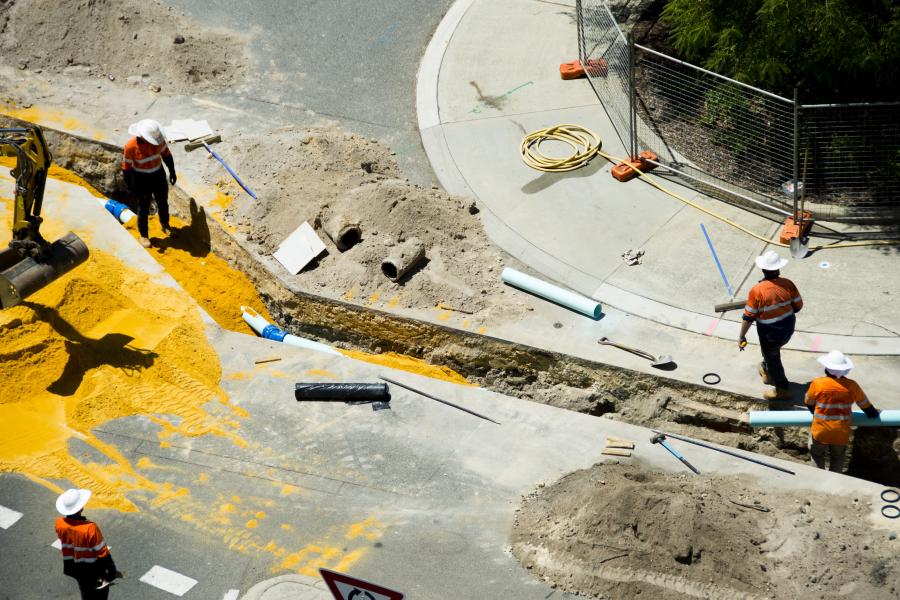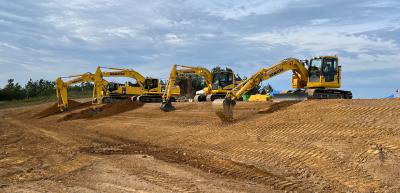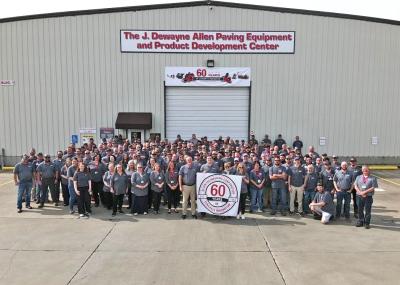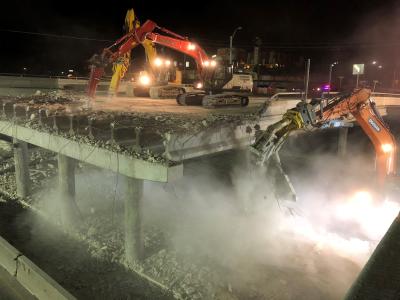Despite employees getting vaccinated, contractors will still require masks and social distancing on the job site.
Right now, the construction industry is tackling critical coronavirus vaccine issues: Should employees have the vaccine or not, and does it matter? Can an employer mandate employees be vaccinated before entering a job site? How can an employer successfully overcome vaccine hesitancy?
Deemed essential by the federal government, construction workers have been among priority groups for the coronavirus vaccine.
And professional organizations in the Construction Industry Safety Coalition (CISC) are strongly encouraging employees to get the vaccine. The coalition organized a campaign to urge vaccinations, establishing the COVID-19 Vaccine Awareness Week in mid-April.
"Construction workers have long looked after the welfare of their colleagues," said Stephen E. Sandherr, chief executive officer of the Associated General Contractors (AGC). "Getting their shot is another way that workers can protect their colleagues, as well as their loved ones and community members."
Getting the Message
The goal of the vaccination awareness campaign was to reach as many construction workers, subcontractors and partners as possible.
Though other member organizations felt it was too soon to discuss outcomes, the AGC's Brian Turmail noted reaction to the weeklong event was "overwhelmingly positive."
The importance of safety for the worker, his or her coworkers, and all the people they come in contact with, was the message.
"I think the most powerful message our members hit upon is, ‘Hey, you wouldn't let someone go onto a job site without a hard hat and safety vest,'" said Turmail, AGC vice president of public affairs. "Getting vaccinated for the coronavirus is the same thing."
Safety in construction is built around everyone keeping each other safe, he stressed. "What are you doing to protect your coworkers and those outside of work from the coronavirus?"
Resources and information related to the safety, effectiveness and availability of vaccines in workers' areas were distributed.
AGC created toolbox talks and a public service announcement that firms can use while talking to workers.
The PSAs highlighted the safety testing that the various vaccines have undergone, so workers know the medicines are safe to take.
"But an even stronger message is, ‘You wouldn't back up an end loader without looking around you. Why would you not get vaccinated?'" said Turmail.
He added in this situation, the peer pressure is positive. "What we're trying to accomplish is to show construction workers how easy it is to get vaccinated."
CISC also partnered with the CDC's National Institute for Occupational Safety and Health to host a vaccination education webinar for the industry.
Coalition members, including AGC, continue to urge construction workers to get vaccinated.
"The construction industry showed America how to work safely during the early days of the pandemic," said Sandherr. "And now we are going to show America how important it is to get their vaccines as soon as they can."
Encouraging Vaccinations
In February, labor law firm Littler, surveying employers nationwide, found only 6 percent of respondents planned to require employees to get vaccinated.
In fact, nearly half of respondents had decided they would not mandate the COVID-19 vaccine for several reasons, chiefly company culture and employee relations issues.
Companies are opting instead to encourage vaccination, continuing remote work and maintaining safety protocols on the job site.
AGC and law firm Phillips Fisher created vaccination guidance for contractor members developing employee vaccination protocol.
On the question of how to overcome employee hesitancy, AGC stated that employers should educate regarding the benefits and safety of the vaccine, compared to the risks of not being vaccinated.
"They should also explore ways to make it easier for employees to access the vaccines."
Examples included providing information about local vaccine providers and organizing clinics at or near job sites.
Paying for vaccination costs and allowing employees to get vaccinated during paid work hours were other options.
Those participating in the CISC vaccine awareness program learned how easy it was to host a vaccination clinic for employees and their families.
Local health departments and hospitals, as well as labor union partners, can help arrange access, suggested AGC.
"The easiest part of running an onsite clinic was organizing the clinic," said Turmail of an AGC member who hosted a vaccine clinic.
A "whole host of vendors" can provide the clinic itself in training rooms or on job sites with success, he said.
"Some employers are considering incentives to encourage employees to get vaccinated. But these efforts appear to be subject to HIPAA and EEOC rules regarding wellness programs," continued the AGC guidance.
Employers should confirm with counsel before implementing incentives, stressed the guidance.
Legal Ramifications
Turmail said whether contractors mandate or encourage vaccinations may be dictated by jobsite owners or clients.
Though not aware of any AGC member contractors who have mandated their employees get vaccinated, he said many are anticipating insistence on it.
"They see a future where project owners will insist every worker on the project be vaccinated," he said.
"It doesn't help that OSHA came out with guidance put in place with disincentives for mandating vaccinations," added Turmail.
OSHA recently stated that if the vaccine is mandated and the vaccinated worker has an adverse reaction to the vaccine, that reportable incident is the responsibility of the employer.
In an updated series to answers to its COVID-19 Frequently Asked Questions (FAQs), OSHA has addressed rules for recordable incidents.
If an employer requires an employee to get vaccinated as a condition of employment, any adverse reaction to the vaccine is work-related, stated OSHA.
"The adverse reaction is recordable if it is a new case under 29 CFR 1904.6 and meets one or more of the general recording criteria in 29 CFR 1904.7."
Adverse reactions to recommended coronavirus vaccines may be recordable if the reaction is work-related, a new case and meets one or more of the general recording criteria in 29 CFR.
However, "OSHA is exercising its enforcement discretion to only require the recording of adverse effects to required vaccines at this time," reads the FAQ response.
"Therefore, you do not need to record adverse effects from COVID-19 vaccines that you recommend, but do not require."
Design-build firm Clayco Construction, headquartered in St. Louis, Missouri, announced in April it was mandating both worker coronavirus vaccinations and a return to offices.
CEO Bob Clark said the company's goal was to set an example and "step out from the shadows, but he's changed his mind since OSHA updated the guidance.
"We, sadly, had to back off our mandate because OSHA did something I don't understand at all," Clark said in an ENR Critical Path podcast
The National Law Review analyzed OSHA's latest coronavirus FAQs and noted that for this discretion to apply, the vaccine must be truly voluntary.
"For example, an employee's choice to accept or reject the vaccine cannot affect their performance rating or professional advancement," reads the analysis.
An employee who chooses not to receive the vaccine cannot suffer any repercussions from this choice, it continues.
"If employees are not free to choose whether or not to receive the vaccine without fearing adverse action, then the vaccine is not merely ‘recommended.'"
The analysis also notes that exercise of this discretion is intended only to provide clarity regarding OSHA's expectations as to the recording of adverse effects during the health emergency.
"It does not change any of employers' other responsibilities under OSHA's recordkeeping regulations or any of OSHA's interpretations of those regulations."
Finally, the National Law Review noted that this answer applies to a variety of scenarios where employers recommend but do not require vaccines.
Where the employer makes the COVID-19 vaccine available to employees at work, where the employer makes arrangements for employees to receive the vaccine at an offsite location and where the employer offers the vaccine as part of a voluntary health and wellness program at the workplace are three examples.
"In other words, the method by which employees might receive a recommended vaccine does not matter for the sake of this question."
There will inevitably become a split in the workforce among those who have and have not been vaccinated, noted the Littler survey summary.
Some 72 percent of survey respondents were concerned about providing reasonable accommodations to those who cannot or who refuse to get vaccinated.
Littler believes this concern may explain why most respondents appear to be separating remote work policies from vaccinations.
"It's tempting to see vaccines as a cure-all for the extreme disruption wrought by COVID-19," said Devjani Mishra, on Littler's COVID-19 task force.
But the reality is "they are just one arrow in the quiver for employers," who must continue existing safety protocols, including symptom screenings, travel restrictions, face masks and distancing, said Mishra.
"Especially in the transition period — when some workers are vaccinated, and others are not — organizations must remain hypervigilant in enforcing these policies as a matter of workplace safety, while being mindful of employee morale."
Positive Peer Pressure
Clayco Construction CEO Clark told employees that workers must come back to the office by May 10.
He notified employees that with their increasing availability vaccinations would be mandatory, with time off available to get them.
He's allowing exceptions for medical reasons, pregnancies and "sincerely held" religious beliefs.
Clark said only a handful of employees of the Chicago-based company had applied for exceptions.
Among several safety precautions in place, Clayco will still require employees to wear masks.
Clark said Equal Opportunity Employment Commission rules allow the vaccine mandate.
He believes Clayco is not as efficient when employees work from home, though it grew revenue during the pandemic as work at job sites continued.
"Anybody who says they can be completely remote I think will suffer the consequences of not being efficient and not being able to recruit effectively," he said.
"One of the most important things about Clayco is the people culture, and we can't continue to keep our culture the way that we are working remotely."
Plus, he said, some 10,000 field workers continued to report to job sites across the United States, many via commercial flight, with no virus cases directly attributable to the travel.
So, it's not fair, Clark said, to expect those employees to report to work in person and not expect the same of support staff.
The slow pace of companies returning workers to offices frustrates Clark, according to the Business Journal article, especially in industries he works with.
"If we don't all come back, how do all of the businesses that rely on all of us come back, survive?" he continued. "We have to draw a line. The vaccine is available, safe, incredibly effective and it's time." CEG
Today's top stories




















